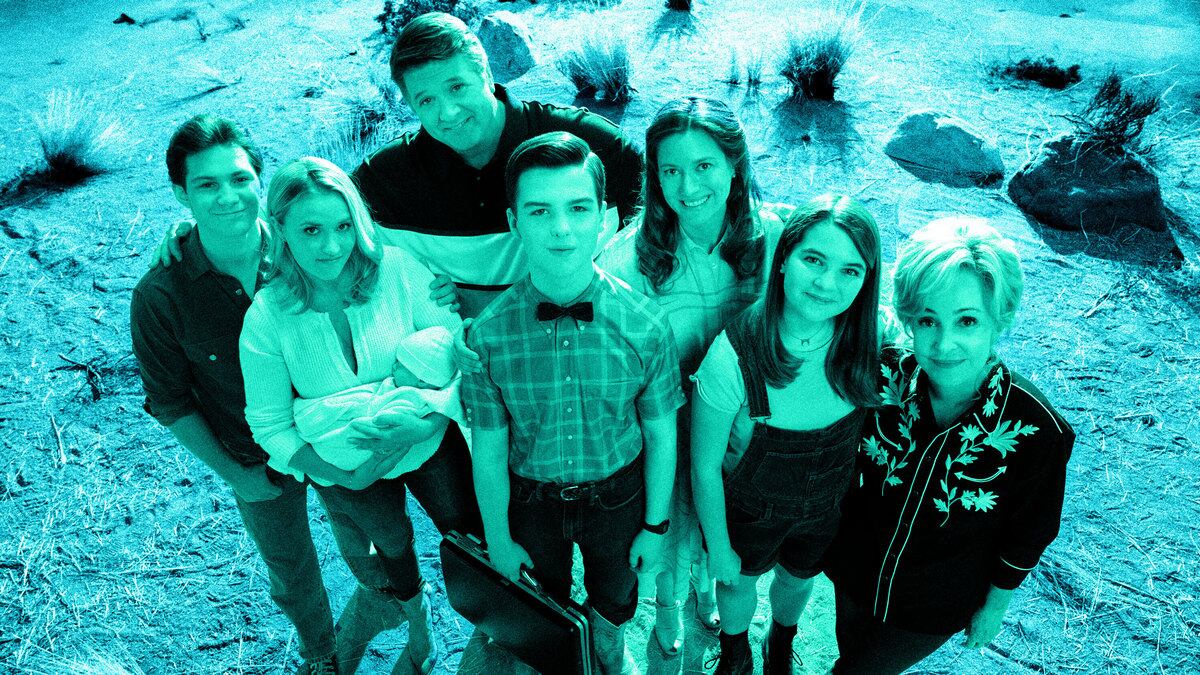Have you seen this show on Netflix that everyone’s watching? It’s set in a small Texas town in the early 1990s and it follows a super-smart, socially awkward kid who lives with his football coach father, his Bible-thumping mother, his tomboy twin sister, and his mullet-head jock older brother. It’s a gentle, grounded comedy, with some sharp points to make about how even the most conservative people buck up against the limits of conformity. The supporting cast includes the likes of Annie Potts, Wallace Shawn, Danielle Pinnock, Jason Alexander, Ed Begley Jr., Wendie Malick, Craig T. Nelson, and Reba McEntire.
Really, the only problem is the name of the main character. It’s Sheldon Cooper… y’know, the fussy nerd Jim Parsons played for 12 seasons on The Big Bang Theory.
This Thursday night, CBS will begin airing the seventh and final season of The Big Bang Theory spinoff/prequel Young Sheldon, which has been a consistent Top 10 Nielsen hit since it debuted. Late last year, Netflix added Young Sheldon, and it’s been among that service’s top 10 most-watched shows ever since. Young Sheldon is widely beloved.

Young Sheldon is getting to that age where he's just ... Sheldon.
Robert Voets / CBSBut it’s never really been respected, for reasons that have a lot to do with its origins. The Big Bang Theory was also incredibly popular, but its critical reputation suffered because it was a traditional sitcom, shot with multiple cameras on a stagey-looking set, and peppered with audience laughter. It was dinged by critics and hip telephiles for being broad and cartoonish. The conventional wisdom also held that The Big Bang Theory had a snickering take on “nerds” and “hot girls” reminiscent of an ’80s teen sex comedy. (The show was actually more nuanced than that, but that’s a subject for another day.)
Young Sheldon is a single-camera sitcom with a filmic look and no laughter on the soundtrack — similar in format to kinds of half-hour shows that top critics’ lists and win awards. Yet for the entirety of its run, Young Sheldon’s name has been a shorthand for the kind of low-imagination, lowest-common-denominator pablum presumed to be network TV’s stock-in-trade. Would critics and TV connoisseurs be so dismissive if this sweet, smart, deeply humane dramedy about various Texas misfits was called, say, Young Steve? Or to put it another way: Have the folks who mock Young Sheldon ever watched it?
If they tune in to the first episode of the final season, what they’ll find is something charmingly unassuming. The show puts its characters through the wringer, granted. Season Six ended with the adolescent genius Sheldon (Iain Armitage) flying off to spend a summer at a German university, chaperoned by his mother, Mary (Zoe Perry). On that same day, a tornado swept through the town of Medford, destroying the home of Sheldon’s entrepreneurial grandmother, Connie (Potts), and scattering the money she’d earned from her laundromat’s secret back room of video poker machines. So yes, the levels of melodrama here can skew high.
But it’s rarely over the top. Young Sheldon works in softer, mellower tones. Connie’s troubles in the Season 7 premiere are less about “how to rebuild after losing everything” and more about insurance woes, and keeping a needy boyfriend (Nelson) from pressuring her into living together, and dealing with the repercussions of the family’s hyper-judgmental pastor (Matt Hobby) discovering her gambling business.
The writers—led by Chuck Lorre and Steven Molaro—are interested in how the fundamental natures of these characters make change difficult. The show takes its cues from Sheldon himself: a neurodivergent prodigy capable of astonishing precocity but also fiercely reliant on routine. So it goes with his family. Connie’s stubborn insistence on living by her own rules and Mary’s anxious need to keep turning every subject back to Jesus provide fodder for jokes but also complicate the Coopers’ lives. Mary and her husband, George (Lance Barber), for example, have had marital problems for years because of her tendency to prioritize the Lord.
Let’s keep some perspective. Young Sheldon isn’t Reservation Dogs. It’s not The Bear. It’s a family-friendly network TV sitcom with some of the common flaws of the form. The score is too persistent and bouncy. The comedy often relies on characters hitting the same note over and over. The show isn’t top-shelf, can’t-miss great.

Emily Osment as Mandy.
Bill Inoshita / Warner Bros. Entertainment / CBSBut it’s possible to create something that connects with a large audience yet still has a meaningful point of view — as Lorre has shown with series like Dharma & Greg, The Kominsky Method, and the sublime Mom. Young Sheldon isn’t hacky. It’s the kind of show that in other contexts—like if it were some barely watched dramedy on The CW, with no Big Bang Theory connection—might even be a cause célèbre among critics.
There’s a moment in next week’s Young Sheldon when Sheldon struggles at his German science program and his instructor tells him that being a preteen college student is only impressive at first. At a certain point, he says, when people see a dog playing a piano, they stop saying, “Wow! A dog!” and start asking, “Is he any good?” Young Sheldon was a hit out of the gate because it spun off from one of the most popular sitcoms of the 2010s. It has thrived for six years because this dog can play.






